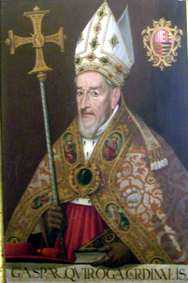Gaspar de Quiroga y Vela

Gaspar de Quiroga y Vela (Madrigal de las Altas Torres, Ávila, 13 January 1512 - 20 November 1595) was a prominent Catholic official who rose to become General Inquisitor of Spain, from 1573 to 1595, and Archbishop of Toledo from 1577 to 1595. He was named a Cardinal by Pope Gregory X in 1578. He was the nephew of the 1st Bishop of Michoacán, Mexico, Vasco de Quiroga, (1470 - 1565).
Biography
He was educated as a Doctor in Theology and Law at the University of Salamanca. He was sent by King Philip II as an envoy to Rome and to the Spanish-administered territories in the Italian peninsula.
He served as a member of the Spanish High Council of Justice since 1563 and as Bishop of Cuenca, (1561–1577), being then promoted to Archbishop of Toledo, to replace former Imperial diplomat Archbishop of Toledo, Navarrese from the Dominican Order Bartolomé de Carranza (Miranda de Arga, Navarra, 1503 – Rome, Italy, 2 May 1576) in prison in Rome for some further 9 years, while defended there in front of Pope Pius V, deceased May 1572, by Navarrese Martín de Azpilcueta y Jaureguizar (Barásoain, Navarra, 13 December 1492 - Rome, Italy, 21 June 1586) to take him out of the clutches of Inquisitor Fernando de Valdés Salas, (1483 - 1567), who had detained him previously for the period August 1559 - April 1567, some 8 years.
He was a patron in Toledo of the Greek-Spanish painter Doménikos Theotokópoulos, usually known as El Greco, (1541 - resident in Toledo, Spain, since 1577 - Toledo, Spain, 1614).
It is claimed that Quiroga portrait is found in the face of Saint Augustine in the famous Greco painting The Burial of the Count of Orgaz.
Quiroga liberated from the Inquisition's prisons the mystical poet Fray Luis de León, (1527 - 1591) who had been imprisoned for over 4 years at Valladolid, from March 1572 until December 1576, for publishing, amongst other things, a Spanish translation of the Song of Solomon, both of his parents having Jewish ancestry albeit being himself an Augustinian monk expert in Greek, Latin and Hebrew.
Around 1584, Quiroga built at the other side of the River Tagus, in the area known as the "Cigarrales", a summer house now occupied by a hotel.
See also
References
External links
- Caminodelaordendesantiago.net
- PIZARRO LLORENTE, Henar. "Un gran patrón en la corte de Felipe II : Don Gaspar de Quiroga".Pizarro Llorente, Henar. Publ. Madrid : Universidad Pontificia de Comillas, (2004), 620 pages ; 24 cm., Bibliography and Index, ISBN 84-8468-147-5
- Descargas.cervantesvirtual.com
- Cervantesvirtual.com
- Books.google.es
- Madrigal-aatt.net
| Catholic Church titles | ||
|---|---|---|
| Preceded by Bernardo de Fresneda |
1561–1577 |
Succeeded by Diego de Covarubias y Leyva |
| Preceded by Bartolomé Carranza |
1577–1594 |
Succeeded by Albert VII of Austria |
| Preceded by Pedro Ponce de León |
Grand Inquisitor of Spain 1573–1594 |
Succeeded by Jerónimo Manrique de Lara |
| Preceded by Gaspar Cervantes de Gaeta |
1578–1594 |
Succeeded by Pompeo Arrigoni |
|